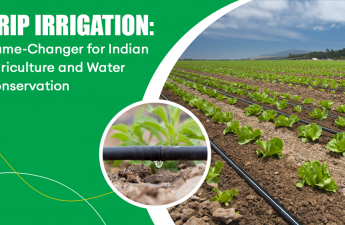Agricultural spray pumps are crucial tools for modern farming because they allow for effective pest control and crop management. They are, however, susceptible to issues that can impair their performance, just like any other piece of machinery. In this blog post, we’ll go over some common issues with agriculture spray pumps and offer troubleshooting tips to help farmers overcome these obstacles.
1. Low-Pressure Output
Issue: Low pressure can cause uneven spray distribution, reducing the efficacy of pesticides or fertilisers.
Solution: Check for clogged nozzles, hoses or filters as a solution. Any clogged components should be cleaned or replaced. Inspect the pump’s diaphragm and piston for wear and tear, and replace them as needed.
2. Leaks and Drips
Issue: Leaks not only waste valuable chemicals but also endanger the environment.
Solution: Check the pump for damaged seals, gaskets or hoses. Tighten any loose connections and replace any damaged parts as soon as possible. Seal deterioration can be avoided with regular maintenance and proper storage.
3. Irregular Spray Pattern
Issue: An irregular spray pattern can result in over- or under-application of chemicals, negatively impacting crop health.
Solution: Clean or replace clogged nozzles, and make sure they’re the right size for your application. Replace any worn-out nozzle tips to maintain a consistent spray pattern.
4. Pump Not Priming
Issue: If the pump fails to prime, spraying may be difficult to initiate.
Solution: Inspect the suction line, fittings, and pump housing for air leaks. Tighten connections and replace faulty components. To avoid blockages, make sure the suction strainer or filter is clean and properly positioned.
5. Unusual Vibration and Noise
Issue: Unusual vibration and noise in pump components can indicate misalignment or wear.
Solution: Examine the shaft, bearings, and couplings of the pump for wear. Replace worn-out components and check for proper alignment. Regular lubrication of moving parts can also help to reduce friction and noise.
6. Inadequate Agitation
Issue: Inadequate agitation causes uneven chemical distribution in the tank, reducing spray effectiveness.
Solution: Examine the agitation system, including the impeller, shaft, and blades. Any clogged or damaged components should be cleaned or replaced. To achieve optimal mixing, adjust the agitation speed.
7. Electrical Problems
Issue: Electrical issues, such as a faulty switch or motor, can prevent the pump from working.
Solution: Examine the electrical connections, wires, and switches for signs of wear and tear. Replace any faulty components and ensure that the power supply meets the pump’s specifications.
Conclusion
To prevent common issues with agriculture spray pumps, farmers need to prioritize regular maintenance, proper storage, and timely repairs. By understanding these problems and implementing the suggested troubleshooting techniques, they can ensure the efficient and reliable operation of their spray equipment.
Padgilwar Corporation, the leading manufacturer of agricultural products, produces various types of spray pumps that are efficient, robust, user-friendly, and durable. We are a reliable partner who is ready to assist you if you have any issue with our spray pumps.



